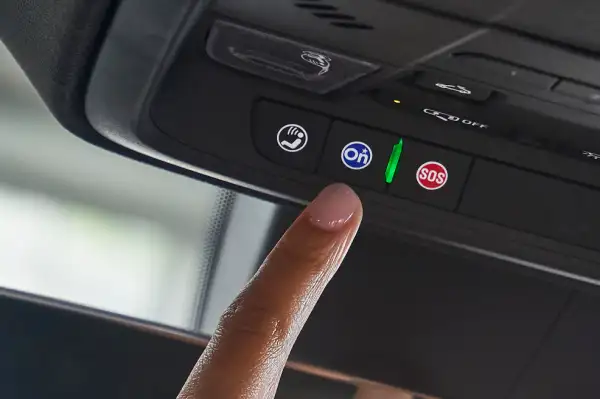GM and Other Automakers Want to Sell You Car Insurance. But Are the Policies Any Good?

GM doesn’t just want to make your next car. It wants to insure it as well.
For as long as they've been making cars, automakers have been financing them, sometimes making more money on the loan than on the car itself. While they've dabbled in insuring cars, too, they're now stepping up their insurance efforts with the help of new technology.
Ford has announced partnerships with several insurers, as has Toyota with Nationwide, and electric car maker Tesla already offers its own insurance. Now America's biggest automaker plans to begin writing its own policies next month.
Like the others' offerings, GM's OnStar Insurance will employ what's known as telematics, which uses data on how well and how far you drive to set premiums, as well as provide feedback on your driving. While convenient and potentially cost-saving, these programs — and automakers offering insurance, period — can come with drawbacks.
GM's insurance launch
GM announced OnStar Insurance this month, and in January will begin writing policies in Arizona. Further states will follow later in 2021, with exact dates as yet clear. The insurance will be available not only to owners of GM vehicles but to any driver, says OnStar Insurance CEO Andrew Rose.
For owners of newer GM vehicles (model year 2015 and onward), on-board OnStar navigation units (with their distinctive blue button) will track and report about your driving. The data will be used only if the driver wishes it, Rose says.
That integration skips the need with many telematics policies to use standalone devices or mobile apps to track driving. For example, drivers of non-GM vehicles will send tracking data to OnStar Insurance via their smartphone, Rose says, using the OnStar Guardian smartphone app.
Automakers and insurance
OnStar Insurance differs from GM’s previous insurance venture — GMAC Insurance, which was discontinued in 2008 — in more than its technology. Where GMAC wrote its own policies, those for OnStar Insurance will be written and serviced by American Family Insurance. Rose says American will handle such tasks as pricing premiums and processing claims.
That may help GM avoid the startup issues of Tesla, which is available only in California and has been marred with problems including faulty premium-pricing algorithms. Rose says OnStar Insurance will also benefit from OnStar’s existing customer service know-how, such as its experience in providing roadside assistance. For example, as OnStar Insurance evolves, Rose says, the emergency call to OnStar after an accident could also automatically begin the claims process.
OnStar currently powers free turn-by-turn navigation and extra-cost roadside assistance and WiFi connectivity. OnStar’s experience in handling calls could allow it to escape the fate of Google, a newcomer to cell service, which last year suffered a host of embarrassing customer-service failures after launching its Fi phone. Rose says GM engaged American Family in part because they wanted the insurer to help deliver “a fantastic customer experience from day one” in areas like handling claims that aren’t part of GM’s recent history.
But price is a leading buying consideration for auto insurance — important to more than nine out of 10 of consumers, according to one survey. And it’s as yet unclear whether OnStar Insurance will deliver on value.
With the insurance available in only one state, and to GM employees, comprehensive price comparisons are impossible. Still, when ValuePenguin priced the new service for a 30-year-old Phoenix resident driving a 2020 Chevrolet Equinox, OnStar’s premium was by far the highest of seven companies, costing nearly $2,000 more per year.
Rose dismisses those findings as "a single person and situation in a single geographic location. No insurance company will offer the cheapest prices for everyone.” He promises OnStar Insurance will offer “very competitive prices for a lot of people out there,” including eventual discounts for those who sign on to multiple GM products such as financing and subscription OnStar services.
GM will not formally partner with additional insurers, as Ford is doing by allowing several firms to receive data from its own on-board telematics tracking system. But Rose says the GM technology will allow owners, if they wish, to send “a subset of their driving data” to third-party data companies. Those providers can then send data to other telematics-based insurers to obtain competing bids if the driver wants that.
Several other automakers, including Honda and Nissan, have agreements to share data with one or more of these data exchanges, again provided the driver grants permission for such sharing.
Giving The GM Offering A Look
As it launches across the country over the course of 2021, OnStar Insurance will be most worth a try for owners of late-model GM vehicles, whose OnStar gear is compatible with the insurance and may benefit from the most discounts on the offering.
Even those drivers, though, should consider supplementing any trial with those for other telematics offerings, from both major insurers such as Allstate and Progressive and pay-as-you-go insurance from insurtech companies such as Metromile and Root.
It wouldn’t hurt to also get quotes for some old-school policies that don’t use telematics, since the new technology doesn’t assure lower premiums for all, especially at this relatively early stage of its development.
More on Car Insurance
Money’s Top Picks
Car Insurance Reviews Learn More |
